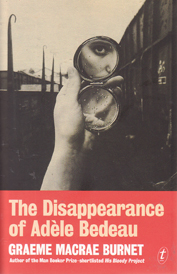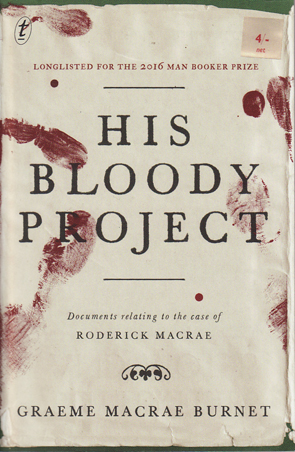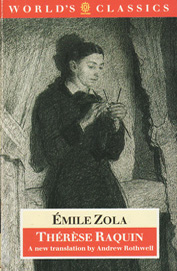I was drawn to this book after reading Burnet’s second novel His Bloody Project, short-listed for the Man Booker Prize last year. That novel was skilled in its plotting, psychological depth, the precision of its writing and interest for the reader. When I saw this first book on the shelf, I immediately bought it. And I’m happy to say, I enjoyed it as much as His Bloody Project.
Burnet’s novels both concern themselves with crime. In His Bloody Project, Roderick Macrae is imprisoned for the brutal killing of several people, including children. The narrative is largely drawn from an account Roderick composes in prison, which reveals him to be highly intelligent, and eliciting far more sympathy from the reader than you might expect. The Disappearance of Adèle Bedeau also employs a fictional author. In both novels, Graeme Macrae Burnet is credited as either an editor or translator of the works. This use of pseudo-author to provide a metatextual context for his work is interesting, particularly in this first book. After all, a first-time writer, born in Scotland, does not choose to tell his story through a fictional French author on a whim, I suspect. The novel ends with a translator’s afterword that gives a detailed history of Raymond Brunet (again, a thinly disguised variation on Burnet’s own name) and his one and only novel which has become something of a minor classic in France, we are told.
The plot is centred upon two characters, Manfred Baumann, a hapless bank manager estranged from humanity, and Inspector Gorski, responsible for the investigation of the disappearance of Adèle Bedeau, a waitress at a restaurant that Manfred frequents. The reader is aware from the start that Manfred has nothing to do with Adèle’s disappearance, but Manfred is routinely questioned by Gorski who becomes suspicious. Manfred, we learn, is actually responsible for the death of a girl twenty years prior to the beginning of the story. Gorski investigated it as a new detective, and now bears a weight of guilt from that, having sent an innocent man to jail. With this you have the ingredients of an interesting psychological crime story.
The faux publication and author history Burnet chooses to credit the novel with is interesting as it places it outside the mostly English Cosy detective school, as well as the mostly American hard-boiled genre. This is a decidedly postmodern work, choosing to construct a narrative in relation to French Naturalism, typified by writers like Émile Zola, as well as Simenon’s roman durs, or more difficult works, that concerned themselves with psychological studies of human weakness. Burnet does this quite self-consciously:
In the end he chose two novels by Zola from his grandfather’s bookshelf … Zola’s description of his characters, trapped by temperament and lacking free will, felt like a release to Manfred … What, after all, had led him to meet the girl in the yellow dress? Not free will, but fate. (71)
and:
Juliette reminded Manfred of the speech he had delivered on the subject of Zola’s preface to Thérèse Raquin. If he really believed what he had said, weren’t we all like rats on a wheel scurrying in a predetermined direction, unable to change course? (74)
In writing Thérèse Raquin, Zola had been quite specific in his preface concerning the aim of the novel:
In Thérèse Raquin I set out to study, not characters, but temperaments. Therein lies the whole essence of the book. I chose to portray individuals existing under the sovereign dominion of their nerves and their blood, devoid of free will and drawn into every act of their lives by the inescapable promptings of their flesh.
…
I tried, for instance, to explain the strange union that can come about between two different temperaments, and to show the profound disorders wrought in a sanguine nature through contact with a nervous one. If the novel is read with care it will be seen that each chapter is the study of a curious physiological case.
In Thérèse Raquin, Thérèse and her lover, Laurent, murder her sickly husband, Camille, so they might be together. The psychological study Zola hopes to effect in the story is never more dramatically illustrated than in chapter 22, wherein Zola effects a ‘scientific’ dissection of the lovers’ temperaments in the aftermath of the murder, and the debilitating weight of guilt that afflicts their relationship.
Of course, Zola’s writing is influenced by the impact of Darwin’s relatively new scientific discoveries concerning evolution. Darwinian thought, applied to human society, was apt to have some unfortunate implications, and the idea of biological determinism is a concept that arose, not only creating a belief in social types, but justifying class and cementing in the minds of many a belief in a criminal class.
This is a matter that plagues Manfred, either consciously or unconsciously throughout Burnet’s book:
For years he had told himself that there was nothing he could do about his situation, that circumstances, his temperament, dictated how he behaved. (153)
Manfred, emotionally crippled by the early death of his parents and his accidental killing of a young girl in his youth, is left a paranoid wreck who can only cope in society by constantly analysing his own actions and trying to act the part of a normal man. It is his paranoia that causes him to tell Gorski needless lies which sparks the inspector’s suspicions.
Gorski, himself, also represents some of the same struggle. Married to a wife in the fashion industry, she constantly makes him aware of his lowly status as a detective. When meeting the upper-classes, he cannot help feeling his inferiority: “Old money, Gorski had long since learned, treated the police with disdain. They were received as, in the past, the gamekeeper or the stableboy might have been.” (179-180) Gorski cannot shake a sense that “that he was privately convinced that he had found his level”. Gorski is also psychologically plagued by the murder of twenty years ago, as is Manfred. He sent an innocent man to jail. He failed to solve the case. His failure has helped define him, and for the last twenty years he has returned constantly to the scene of the crime. If determinist struggle is defined by Manfred in terms of free will and fate, it is defined by Gorski in terms of empiricism and the hunch:
Gorski loathed hunches. They were an excuse of ill-disciplined thinking, part of a vocabulary cops liked to use to cloak their work in mystique … Yet his plodding adherence to empiricism had got him nowhere . . . (176)
The choice Gorski makes to change course reflects, in my opinion, Burnet’s literary choices. When younger Gorski, we are told, “devoured Simenon, learning, he thought, the subtle arts of detection from the inscrutable Maigret.”(95) But Maigret, a popular detective series by Simonen, does not reflect the psychological depth that Burnet aims for here. For The Disappearance of Adèle Bedeau his model is more likely to be Simenon’s roman durs and an engagement with the problems of Zola’s empirical approach to human nature.
I think the psychological struggle of the characters, caught between what they see as binary choices (but with their struggles revealing something more nuanced and interesting) is what sets this novel apart from many popular crime novels. Whodunnit is of no real consequence to the plot. It is the complexity of human society and personal experience that is interesting here, and the novel’s very real and compelling characters. Burnet has chosen an interesting and relevant literary context in which to frame this.
Highly recommended.

 RSS Feed
RSS Feed Facebook
Facebook Instagram
Instagram YouTube
YouTube Subscribe to our Newsletter
Subscribe to our Newsletter





No one has commented yet. Be the first!